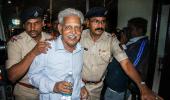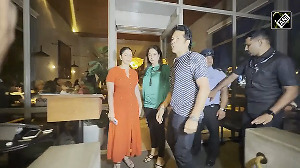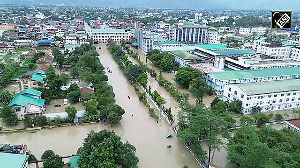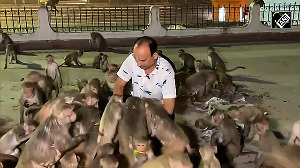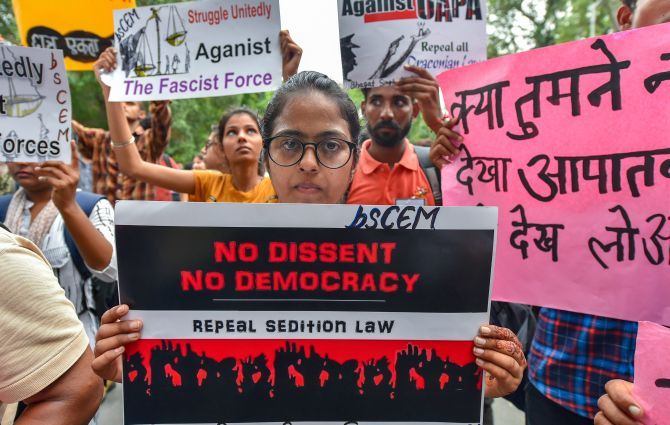
The Supreme Court on Monday said it may order a probe by Special Investigation Team if it found that evidence has been 'cooked up' and the material supporting the arrest of the five rights activists in the Koregaon-Bhima violence case needed to be examined.
A bench headed by Chief Justice Dipak Misra extended till September 19 the house arrest of the five rights activists--Varavara Rao, Arun Ferreira, Vernon Gonsalves, Sudha Bharadwaj and Gautam Navlakha-- at their respective homes and said it would accord a final hearing after two days on the plea of historian Romila Thapar and four others.
"Every criminal investigation is based on allegations and we have to see whether there is some material," the bench, also comprising Justices A M Khanwilkar and D Y Chandrachud said.
"First of all we must have a look at the material. If we find that the material is cooked up, we will set up SIT. ... How can we adjudicate against them (Maharashtra police) without hearing them and looking at the material. We will see the materials of the agency," the bench said.
At the outset, Additional Solicitors General Maninder Singh and Tushar Mehta, appearing for the Centre and the Maharashtra government respectively, opposed the plea of Thapar and others, saying what were the materials which had created the impression that the lower judicial forum would not hear the accused.
The bench then said it has granted protection to the accused keeping in mind their liberty and this would continue till the courts below decided their pleas.
"We entertained the case on the foundations of liberty. Issues like independent enquiry...comes at a later stage. Let the accused seek relief below. Meanwhile, our interim order (on house arrest) may continue," the bench said.
"So far as the problem of 'Naxalism' is concerned, it is becoming a bigger problem and has spread throughout the country. That is why I have intervened," Singh said.
This would set a 'dangerous precedent' and 'what is the situation or the case which has not been entertained by the courts below and what is that aspect which creates doubt in their minds, that the lower judicial forum won't hear them', he said.
Mehta said irrespective of the belief of the petitioners that the arrested accused are human rights activists, there was enough materials, seen by him, against them.
"This is not about dissent. This concerns serious offences. Your Lordships may not be convinced now, but evidence from laptops, computers, hard disks will show that they were involved," the law officer said, adding the accused have also resorted to parallel remedies in other courts including the high courts.
"Let them (arrested accused) withdraw their respective petitions in the courts as there cannot be parallel proceedings," he said, adding the 'strangers to the lis' have no locus to file the matter and seek remedy in criminal cases.
The bench said it was not on the point of 'locus' of Thapar and the others and the activists could be made parties as it has been done on a 'daily basis' in high courts.
Senior advocate A M Singhvi, appearing for the historian and others, termed as 'pedantic' the objections of the Centre and Maharashtra and said that after the apex court took note of this case, nothing has taken place in other courts below.
Singhvi said he should be allowed to present the case as it would shock the conscience of the court.
Proceeding with the submissions by referring to documents including the two FIRs, he said the key point that there was a plot to assassinate the Prime Minister was not mentioned in either the FIRs or in the reply filed by the Maharashtra government.
"What we have been hearing that there is a possible attempt to eliminate the Prime Minister. The FIRs and others do not talk about assassination plot," Singhvi said.
He said after the top court's observation asking Maharashtra police not to speak to media about the probe, the 'spreading of lies has subsided' but not stopped.
"Canard has been spread about criminal past of some of the activists," he said and gave details about the status of the matters against some of them.
There were 25 cases against Rao and he is either acquitted or the cases have been withdrawn, he said, adding that against Gonsalves, there were 18 cases and he is acquitted in 17 and the appeal is pending in one.
There were either 10 or 11 cases against Arun Ferreira and he has been acquitted in all of them, Singhvi said.
Referring to the violence case, he said two former judges, one of Supreme Court and other of the high court, were also invited to the event which was being organised for the past 200 years at Bhima Koregaon.
The arrested activists were neither present, nor named in the FIRs, Singhvi said.
The plea by Thapar and economists Prabhat Patnaik and Devaki Jain, sociology professor Satish Deshpande and human rights lawyer Maja Daruwala has sought an independent probe into the arrests and the immediate release of the five activists.
The Maharashtra police had arrested the rights activists on August 28 in connection with an FIR lodged following a conclave -- 'Elgaar Parishad' -- held on December 31 last year that had later triggered violence at Koregaon-Bhima village.
Prominent Telugu poet Rao was arrested on August 28 from Hyderabad, while activists Gonsalves and Ferreira were nabbed from Mumbai, trade union activist Sudha Bharadwaj from Faridabad in Haryana and civil liberties activist Navlakha from Delhi.



